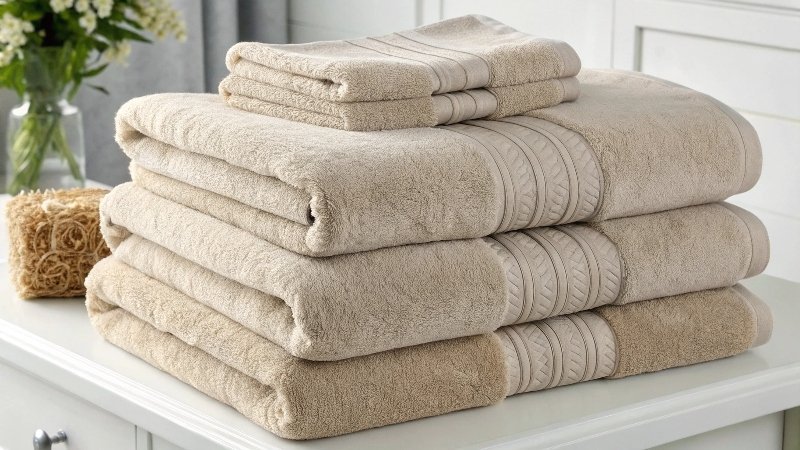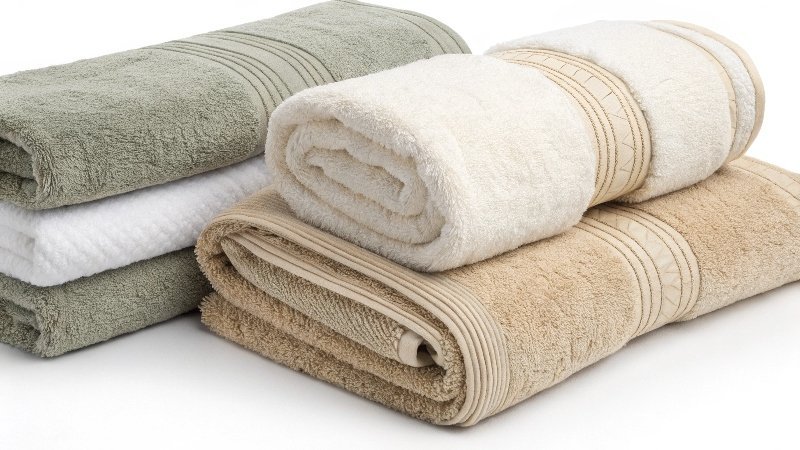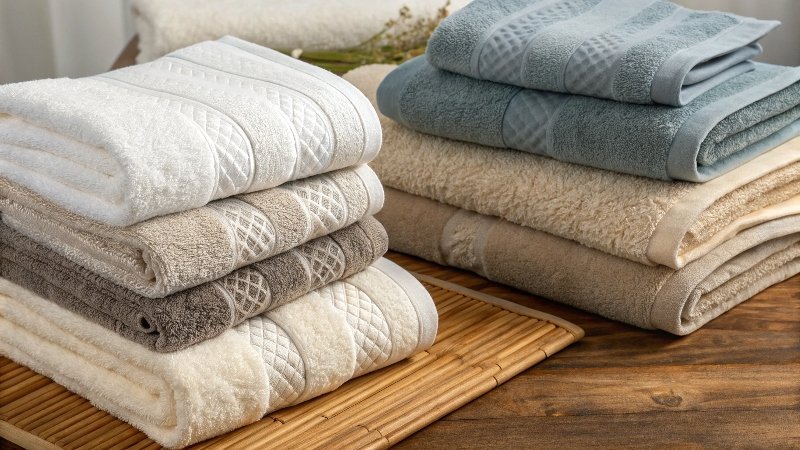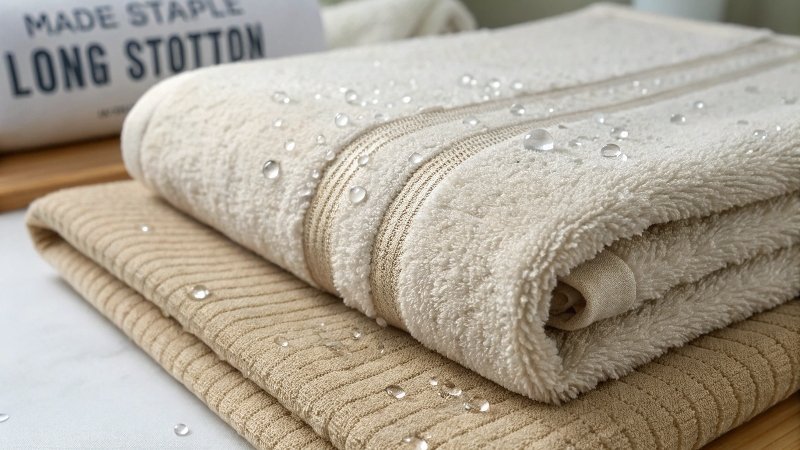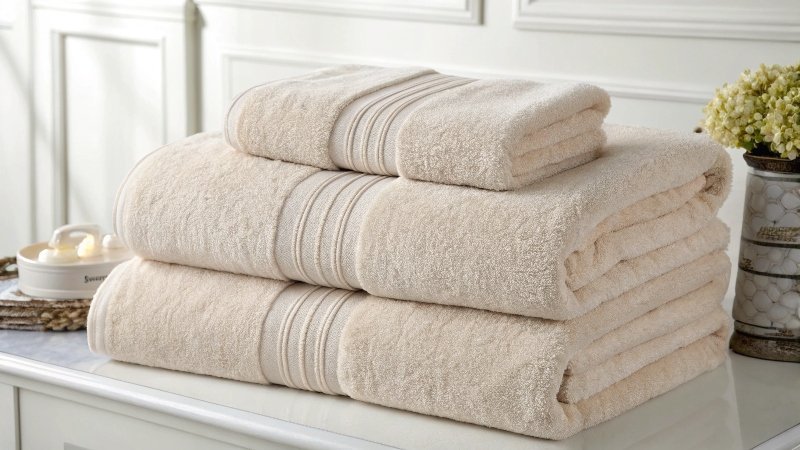Choosing the wrong towel feels like a small mistake, but it’s one you live with daily. Let’s make sure you get it right by understanding what truly makes a great towel.
The best all-around material for towels is 100% cotton, especially long-staple varieties like Turkish or Egyptian cotton. This is because it offers a superior combination of absorbency, softness, and durability that is perfect for everyday luxury and use.
I’ve spent years in the textile industry, and the most common question I get is about materials. It’s the foundation of a good product. A great design on a poor-quality fabric just won’t work, especially for private-label brands where quality is your reputation. Getting the material right from the start saves you time, money, and customer complaints down the road. Let’s break down the options so you can choose with confidence.
What is the best material for towels?
Feeling lost in a sea of fabric options? A wrong choice can mean investing in towels that don’t perform, leading to unhappy customers. Let’s clarify what "best" really means.
For a perfect balance of luxury, absorbency, and strength, long-staple cotton is the best material. However, the "best" choice really depends on the towel’s final use, like microfiber for sports towels or bamboo blends for eco-conscious brands.
When a client asks me for the "best" material, my first question is always, "What is the towel for?" The answer changes everything. A five-star hotel needs something different than a budget-friendly gym or a trendy DTC brand. I once worked with a startup that wanted the most luxurious, heavy towel possible. They chose a high-GSM Egyptian cotton. While the towel was incredibly soft, their customers complained it took forever to dry. We later switched them to a Turkish cotton, which offered a similar luxury feel but dried much faster. It was a better fit for their customers’ lifestyle.
For Everyday Luxury and Home Use
For the main bath towel that you use every day, you want a mix of softness and absorbency. This is where long-staple cottons shine.
- Turkish Cotton: Has long fibers that make it soft and strong. It’s very absorbent but also known for drying relatively quickly. It gets softer and more absorbent with each wash.
- Egyptian Cotton: Famous for its extra-long fibers, which create an incredibly soft and absorbent fabric. These towels are super plush but can hold onto moisture longer.
For Travel, Sports, and Hair Care
Here, performance is more important than luxury. You need something lightweight, compact, and quick-drying.
- Microfiber: A synthetic material, usually a blend of polyester and polyamide. It’s not as soft as cotton, but it’s extremely absorbent, lightweight, and dries in a fraction of the time. This makes it the clear winner for gym bags and suitcases.
What material is used for towels?
You see towels everywhere, but what are they actually made from? This simple question has a surprisingly complex answer that impacts feel, function, and cost. Let’s demystify the common materials.
The vast majority of towels are made from cotton because it is naturally absorbent, soft, and breathable. Other common materials include microfiber (a synthetic polymer), bamboo (processed into rayon), and linen, each offering unique properties.
In my role at TowelTrend, I handle these materials every day. The choice of raw material is the very first step in our production process. While cotton is king, we’ve seen a huge rise in demand for alternatives, especially from brands targeting specific niches. For example, a brand focused on eco-friendly baby products might lean towards a bamboo or organic cotton blend. A brand selling to hair salons will almost exclusively request microfiber. Understanding the source and properties of each material is crucial for matching a product to its market.
The Reigning King: Cotton
Cotton is a natural fiber that grows on a plant. Its quality is determined by the length of its fibers, known as staples.
- Short-Staple Cotton: Has short fibers, resulting in a coarser and weaker yarn. It’s less expensive but prone to pilling and feeling rough over time.
- Long-Staple Cotton (Pima, Turkish): Has longer fibers, creating a smoother, stronger, and more durable yarn. These towels feel softer and last longer.
- Extra-Long-Staple Cotton (Egyptian): The highest grade. Its fibers are the longest, creating the softest and most absorbent towels available.
The Modern Contenders
These materials have gained popularity for their specific performance benefits.
- Microfiber: Made from a blend of polyester and polyamide, which are plastics. The fibers are split to be incredibly thin, creating a massive surface area that is great for trapping water and dirt.
- Bamboo: Bamboo fabric is actually a type of rayon. The woody pulp of the bamboo plant is dissolved in a chemical solution, then spun into fibers. It’s known for its silky softness and antibacterial properties.
What is a good fabric for towels?
Trying to find a "good" fabric can feel confusing. A bad choice leads to a towel that just pushes water around or stays damp for hours. Let’s define what makes a fabric good.
A good towel fabric must be highly absorbent, soft to the touch, durable enough for frequent washing, and able to dry in a reasonable time. Fabrics like long-staple cotton excel in all these areas.
When we develop a new towel line, we obsess over these four qualities. It’s a balancing act. For instance, increasing the weight or GSM (grams per square meter) boosts absorbency and plushness, but it also increases drying time. I often advise new private-label clients to start with a balanced option, like a 600 GSM Turkish cotton towel. It delivers that premium, "good fabric" feel without the practical downsides of an ultra-heavy towel. It’s about finding the sweet spot that provides the best user experience.
Key Qualities of a Good Towel Fabric
To make an informed decision, you need to understand the metrics that define a towel’s quality.
| Quality | What It Means | Best Material/Feature |
|---|---|---|
| Absorbency | The ability to soak up moisture effectively. Measured in GSM (grams per square meter); higher is generally more absorbent. | High GSM (600-900) Cotton |
| Softness | The feel of the fabric against the skin. Determined by fiber type (long-staple) and weave (e.g., terry cloth). | Egyptian Cotton, Bamboo |
| Durability | The ability to withstand use and washing without fraying or thinning. Depends on fiber length and a strong weave. | Long-Staple Cotton (Turkish, Pima) |
| Drying Speed | How quickly the towel releases moisture and dries after use. Lower GSM and certain materials are better. | Microfiber, Linen, Turkish Cotton |
Which material is good for bath towels?
When you step out of the shower, you need a towel that is thirsty and comforting. Using the wrong material can leave you feeling damp and unsatisfied. Let’s pinpoint the best choice.
For bath towels, 100% long-staple cotton like Turkish or Egyptian is the best material. It provides the high absorbency you need after a shower and offers a soft, luxurious feel against the skin.
The bath towel is the workhorse of any towel collection, and it’s where you shouldn’t compromise on quality. I remember a hotel procurement manager who was trying to cut costs. He switched from 100% Turkish cotton to a cotton-polyester blend for their bath towels. The complaints started rolling in almost immediately. Guests noted the towels weren’t as absorbent and felt "slippery." They quickly switched back. That experience proves that for the core purpose of drying your body, pure, high-quality cotton is unbeatable. Its natural fibers are designed to absorb water, unlike synthetic fibers which can sometimes just move it around.
Why Cotton Wins for Bath Towels
A bath towel has one primary job: to dry you off completely and comfortably. Cotton is naturally hydrophilic, meaning it loves water.
- Absorbency: A thick cotton terry weave acts like a million tiny sponges, pulling water away from your skin quickly.
- Plushness: The loop pile of a cotton terry towel provides a cushiony, plush feel that spells luxury. A good weight is between 500-700 GSM for that perfect mix of softness and function.
Other Materials for Bath Towels?
While cotton is the top choice, some blends have their place.
- Bamboo-Cotton Blends: Adding bamboo to cotton can increase the silky softness and add a sustainable marketing angle. However, 100% bamboo towels can be less durable than cotton ones.
- Microfiber: While amazing for sports, pure microfiber is not ideal for a bath towel. Its static-like cling can feel strange and less comforting on the skin after a relaxing shower. It’s a functional fabric, not a luxurious one.
Conclusion
Ultimately, the best towel material depends on its purpose. For all-around home and bath use, nothing beats the balanced performance and luxury of 100% long-staple cotton.

